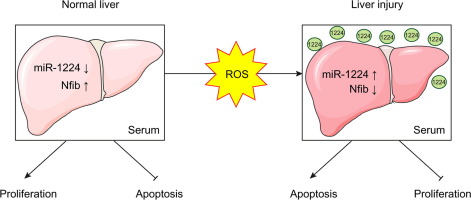当前位置:
X-MOL 学术
›
J. Hepatol.
›
论文详情
Our official English website, www.x-mol.net, welcomes your feedback! (Note: you will need to create a separate account there.)
miR-1224 inhibits cell proliferation in acute liver failure by targeting the antiapoptotic gene Nfib
Journal of Hepatology ( IF 25.7 ) Pub Date : 2017-11-01 , DOI: 10.1016/j.jhep.2017.06.007 Sanchari Roy , Heike Bantel , Franziska Wandrer , Anne Theres Schneider , Jeremie Gautheron , Mihael Vucur , Frank Tacke , Christian Trautwein , Tom Luedde , Christoph Roderburg
Journal of Hepatology ( IF 25.7 ) Pub Date : 2017-11-01 , DOI: 10.1016/j.jhep.2017.06.007 Sanchari Roy , Heike Bantel , Franziska Wandrer , Anne Theres Schneider , Jeremie Gautheron , Mihael Vucur , Frank Tacke , Christian Trautwein , Tom Luedde , Christoph Roderburg

|
BACKGROUND AND AIMS
Patient outcome in acute liver failure (ALF) is crucially determined by the appropriate balance between cell death and compensatory cell proliferation. MicroRNAs (miRNAs) - small non-coding RNAs that function as guide molecules in RNA silencing - have evolved as crucial mediators of nearly all developmental and pathological processes, including the physiology and pathology of the liver. We investigated the role of miR-1224 during ALF. METHODS
We measured miR-1224 in livers of mice in various acute liver disease murine models and in, patients with ALF, using quantitative real-time PCR. We studied the regulation of miR-1224 in AML12 cells and primary hepatocytes upon H2O2 stimulation. Cell proliferation and cell death were analysed by 5-bromo-2'-deoxyuridine and terminal deoxynucleotide transferase nick end labelling stainings, respectively. RESULTS
We found that miR-1224 was up-regulated in hepatocytes upon ischaemia-reperfusion in vivo and in vitro. This was accompanied by impaired proliferation and elevated apoptosis. This function of miR-1224 was mediated by repressing the anti-apoptotic gene Nfib in hepatocytes. Strikingly, miR-1224 was also up-regulated in human livers and the serum of patients with ALF and indicated an unfavourable prognosis with an excellent prognostic value compared to other known serum markers in this clinical setting. CONCLUSIONS
miR-1224 is a previously unrecognised regulator of proliferation after ALF in hepatocytes and represents a novel and specific biomarker of liver injury with prognostic value in ALF. Thus, miR-1224 may represent a target for novel therapeutic and diagnostic strategies in the context of ALF and warrants further testing as a biomarker in prospective trials. Lay summary: In acute liver failure, miR-1224 expression is modulated by oxidative stress. This leads to a decrease in hepatocyte cell proliferation and increase in apoptosis. Increased serum levels of miR-1224 could be a useful diagnostic marker in patients with acute liver failure.
中文翻译:

miR-1224通过靶向抗凋亡基因Nfib抑制急性肝衰竭细胞增殖
背景和目的 急性肝功能衰竭 (ALF) 的患者结果关键取决于细胞死亡和代偿性细胞增殖之间的适当平衡。MicroRNAs (miRNAs) - 在 RNA 沉默中作为指导分子的非编码小 RNA - 已经进化为几乎所有发育和病理过程的关键介质,包括肝脏的生理学和病理学。我们研究了 miR-1224 在 ALF 中的作用。方法我们使用定量实时 PCR 测量了各种急性肝病小鼠模型和 ALF 患者肝脏中的 miR-1224。我们研究了 H2O2 刺激后 AML12 细胞和原代肝细胞中 miR-1224 的调节。通过 5-bromo-2' 分析细胞增殖和细胞死亡 -脱氧尿苷和末端脱氧核苷酸转移酶切口末端标记染色,分别。结果 我们发现 miR-1224 在体内和体外缺血再灌注后在肝细胞中上调。这伴随着增殖受损和细胞凋亡增加。miR-1224 的这种功能是通过抑制肝细胞中的抗凋亡基因 Nfib 来介导的。引人注目的是,miR-1224 在人肝脏和 ALF 患者的血清中也被上调,与该临床环境中的其他已知血清标志物相比,其预后不良,具有极好的预后价值。结论 miR-1224 是一种以前未被认识的肝细胞 ALF 后增殖调节剂,代表了一种新型的特异性肝损伤生物标志物,对 ALF 具有预后价值。因此,miR-1224 可能代表 ALF 背景下新型治疗和诊断策略的靶点,值得在前瞻性试验中作为生物标志物进行进一步测试。总结:在急性肝衰竭中,miR-1224 的表达受氧化应激的调节。这导致肝细胞增殖减少和细胞凋亡增加。升高的 miR-1224 血清水平可能是急性肝衰竭患者的有用诊断标志物。
更新日期:2017-11-01
中文翻译:

miR-1224通过靶向抗凋亡基因Nfib抑制急性肝衰竭细胞增殖
背景和目的 急性肝功能衰竭 (ALF) 的患者结果关键取决于细胞死亡和代偿性细胞增殖之间的适当平衡。MicroRNAs (miRNAs) - 在 RNA 沉默中作为指导分子的非编码小 RNA - 已经进化为几乎所有发育和病理过程的关键介质,包括肝脏的生理学和病理学。我们研究了 miR-1224 在 ALF 中的作用。方法我们使用定量实时 PCR 测量了各种急性肝病小鼠模型和 ALF 患者肝脏中的 miR-1224。我们研究了 H2O2 刺激后 AML12 细胞和原代肝细胞中 miR-1224 的调节。通过 5-bromo-2' 分析细胞增殖和细胞死亡 -脱氧尿苷和末端脱氧核苷酸转移酶切口末端标记染色,分别。结果 我们发现 miR-1224 在体内和体外缺血再灌注后在肝细胞中上调。这伴随着增殖受损和细胞凋亡增加。miR-1224 的这种功能是通过抑制肝细胞中的抗凋亡基因 Nfib 来介导的。引人注目的是,miR-1224 在人肝脏和 ALF 患者的血清中也被上调,与该临床环境中的其他已知血清标志物相比,其预后不良,具有极好的预后价值。结论 miR-1224 是一种以前未被认识的肝细胞 ALF 后增殖调节剂,代表了一种新型的特异性肝损伤生物标志物,对 ALF 具有预后价值。因此,miR-1224 可能代表 ALF 背景下新型治疗和诊断策略的靶点,值得在前瞻性试验中作为生物标志物进行进一步测试。总结:在急性肝衰竭中,miR-1224 的表达受氧化应激的调节。这导致肝细胞增殖减少和细胞凋亡增加。升高的 miR-1224 血清水平可能是急性肝衰竭患者的有用诊断标志物。



























 京公网安备 11010802027423号
京公网安备 11010802027423号